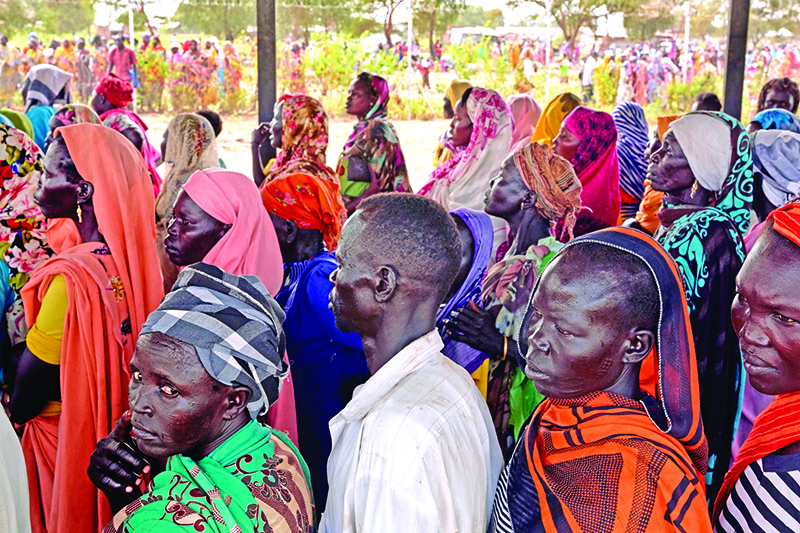
KHARTOUM: Heavy gunfire erupted in the Sudanese capital yesterday as agents of the country's long-feared security agency rejected financial compensation offered as part of a restructuring plan proposed by the new authorities. Shooting broke out at some bases of the Directorate of General Intelligence Service, formerly known as the National Intelligence and Security Service (NISS), the powerful security arm of longtime Islamist autocrat Omar Al-Bashir. NISS agents were at the forefront of a crackdown against protesters during the nationwide uprising that erupted against Bashir in December 2018 and led to his ouster by the army in April.
Witnesses and an AFP correspondent reported that gunfire broke out at the agency's bases in Riyadh and Khartoum North. All streets leading to the two bases were cordoned off, causing traffic jams, witnesses said. The AFP correspondent also said several vehicles carrying soldiers and troops from the country's Rapid Support Forces had headed towards the bases.
A statement issued by the security agency said it was "assessing the situation".
"In the process of restructuring NISS there are some members who have rejected the financial compensation offered for retirement," it said. A security source told AFP that the first shooting broke out in the city of Al-Obeid after which gunfire erupted in the agency's bases in Khartoum.
"Negotiations are now on to solve the issue as they have financial demands," the source said on condition of anonymity. Authorities also closed the capital's airport, the civil aviation authority said. "Khartoum airport has been closed for five hours until 8 pm local time (1800 GMT) for security reasons," spokesman Abdelhafiz Abdelrahim told AFP.
South Sudan, the world's youngest country, descended into civil war in 2013, when President Salva Kiir accused his former deputy and fellow former rebel leader Riek Machar of plotting a coup. About 380,000 people have died in the conflict and some four million have fled their homes.
Fears have grown in recent weeks that a fragile peace deal will not hold after delays in implementing a unity government and ongoing disagreements. While peace has largely held across the country, fighting has continued in the Central Equatoria region between government troops and the National Salvation Front, whose leader Thomas Cirillo Swaka signed the agreement in Rome.
'We are ashamed'
"We are ashamed this peace has eluded us," Pa'Gan Amum Okiech, a member of SSOMA's leadership council and interim chairman of another rebel group, the Real-APLM group, said Monday. "We agree to begin this process of dialogue to reach comprehensive solutions to the crisis," Amum Okiech told journalists, stressing that those solutions would be "inclusive." Progress on a more recent agreement in September 2018 calling for Kiir to form a transitional unity government with Machar has been delayed over a host of unresolved issues.
Rebel groups within the SSOMA refused to sign it because it did not address "root causes" of the war, Amum Okiech said. Sticking points include the return of refugees, the integration of rebel forces into the army, and land issues, such as compensation for the destruction of property during the conflict. Machar was due in Juba yesterday for another round of talks with Kiir. The ceasefire signed on Sunday was mediated by the Community of Sant'Egidio, a lay Catholic organization with ties to the Vatican.
It engages in diplomatic and peace efforts, including organizing the safe passage to Europe of refugees from war-torn areas like Syria. Both Amum Okiech and the head of the government delegation, Barnaba Marial Benjamin, praised Pope Francis for his efforts in pushing for a diplomatic solution to South Sudan's conflict. "This credit goes to his Holiness Pope Francis," said Marial Benjamin, who cited the pontiff's organization of a meeting between Kiir and Machar in April at the Vatican, in which Francis knelt to kiss their feet, imploring for peace.
"Your kneeling in front of our leaders has brought peace to South Sudan," he said. Pope Francis has expressed an interest in travelling to South Sudan and a trip could be announced soon. During a Papal Mass in November, he exhorted the faithful to pray for the country, and in his Christmas address, sent wishes of "peace and prosperity" to South Sudan. - AFP










